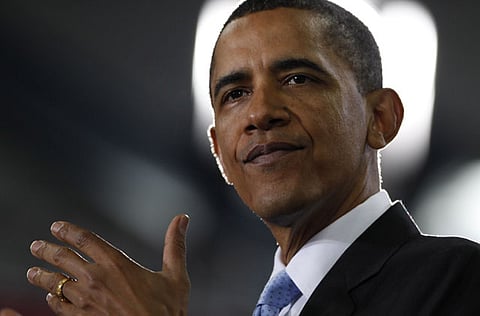US has decided on confrontation
Feeding off American public opinion, Congress is pressuring the Obama administration to go after Iran

It is slowly becoming clear that immense domestic pressure from Congress is forcing the Obama administration to confront Iran. There may still be a few supporters of constructive engagement hiding somewhere in the cupboards of the White House and State Department, but their voices have been swamped by the wave of opinion calling for tough action.
It also suits Barack Obama's strategy managers that he can be seen to be acting tough on Iran, while he moves ahead with his multilateral agenda in other areas. By giving in and agreeing to confront Iran, he has outflanked his Republican opposition, which cannot paint him as a Democrat weakling. The way Obama is talking to Iran is designed to appeal to the former neo-cons and other right-wingers, and is in stark contrast to the engaged way that he is re-fashioning how the world manages its nuclear threat in redrafting the Nuclear Non-Proliferation Treaty, and how he is working with all sorts of groups to achieve consensus on how to move forward on climate change.
Despite following the same outline that the US administration offered Iran, the country's recent deal with Brazil and Turkey has been totally ignored by those who shape foreign policy in Congress, and the administration does not see any political gain from fighting this perception. The Turkey-Brazil deal is being treated as though it never happened, and the debates in Congress refuse to recognise it. The possibility of South-South success where the American superpower has failed is not being considered in the slightest. Instead, the discussions are totally focused on not allowing the US Security Council to delay action.
The assumption is that sanctions and confrontation must happen, and this is being pushed by those who want this course of action. The current effort in Congress is focused on a bill that will impose legal sanctions on companies doing business with Iran, but this will be delayed a few weeks to allow Secretary of State Hillary Clinton to try and make progress on a new round of multilateral sanctions in the UN Security Council. Clinton announced last week that the United States had agreed on the language required for a sanction resolution with the five permanent Security Council members and Germany.
But this will not stop Congress from pushing its bill and forcing the administration to act. "We are going to hold off for a few weeks on moving the bill finally because we want to get that Security Council resolution and see what the European Union does at their June 16 meeting," said Howard Berman, House Foreign Affairs Committee Chairman, on Tuesday as reported in CQ Today. "We would have moved already this week if it weren't for the deal the United States struck in the United Nations," said Berman. The delay is certain to be condemned in both chambers of Congress by the determined supporters of action against Iran. The legislation has already been passed by large bipartisan majorities in both chambers, but needs to be merged into one bill that can be presented for presidential approval.
Limited patience
Berman expects Congress members will understand the desire to wait a bit longer, but he is clear that the legislature will act before the summer, and will not be prepared to wait around forever for UN action. "If it doesn't play out quickly, we're going ahead," he said. "We're doing this before the July 4th recess."
This bill will land the US in all sorts of problems internationally, as it may impose a tough sanctions regime on companies that work in Iran's energy sector. This means the Americans may be required to impose sanctions on companies that are not American but have done business in Iran, and want to work in America or with American companies. This kind of secondary sanctioning is very difficult to impose fairly on all companies, and inevitably leads to all sorts of confusion in the markets. It seems very unlikely that America would impose sanctions on a major Chinese oil company, for example, which might want to supply gasoline to Iran, and also do business with American oil majors.
The impracticality of making such a sanctions bill work is not stopping the Israeli lobby in Washington from supporting it wholeheartedly. The Israelis have prioritised action against Iran and they are actively pushing Congressmen to support sanctions. They want confrontation with Iran, and they look forward to benefiting from the greatly increased tension in the Middle East that such action will lead to.
This desire for action is also something that the US administration and military are working on, to the alarm of many in the Middle East. The New York Times this week published an important article showing not only how Obama has failed to roll back covert anti-Iranian programmes he inherited from Bush, but how General David Petraeus has signed into effect a dramatic intensification of America's covert war against the Islamic Republic. This military plan is linked to the plan for sanctions, and points to the desire for confrontation with Iran, regardless of its actions.



